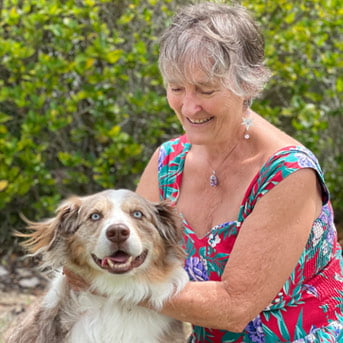Answered by Dr. Christina Chambreau
The most important symptom to worry about if you’re concerned that your pet has heartworms is coughing, and next to that would be exercise intolerance, meaning they just can’t go as far as they had been going on their walks. They also can be lethargic, not wanting to move around a lot, and having a decreased appetite.
Now, these symptoms are common in many diseases, aren’t they? So what’s really important of course is to get tested, and of the tests that are done for heartworms, the first one is blood. They draw some blood and check to see if there are antibodies against the heartworm. If that’s positive, then they’ll do an antigen test. Very importantly would be to do radiographs and/or ultrasounds to see how much heart damage there is, which would depend on the number of adults that are in the heart.
Now, conventional treatment is a drug that kills the adult heartworms in the heart. This could cause some problems, and so often other drugs are used along with it to prevent side effects. Holistically, animals can often be cured over time of their heartworm disease and can end up being healthier in the long run. Using traditional Chinese veterinary medicine, which is acupuncture, Chinese herbs, or homeopathy, and Western herbs are good to use along with the testing that’s been done, so we know what stage the heart is in. A great diet, good exercise, and different supplements help keep the dog healthy while recovering.
This is Christina Chambreau, licensed veterinarian with HolsticActions!. Have a great day!
Suggested Treatments:
- Homeopathy
- Herbs
- Immiticide along with Prednisone and doxycycline
Related Symptoms:
- Cough
- Lethargy
- Exercise intolerance
DISCLAIMER: Holistic Actions! does not provide advice on certified medical treatments. Content is intended for informational purposes only and to equip you with the tools needed for Holistic Medical Decision Making (HMDM). It is not a substitute for clinical assessment, diagnosis, or treatment. Never use content found on the Holistic Actions! website as the basis for ignoring advice from your veterinarian to seek treatment. If you think you may have a veterinary emergency, please call your vet or an animal hospital immediately.

Dr. Christina
Christina Chambreau, DVM, is an internationally known homeopathic veterinarian and associate editor of the Integrative Veterinary Care Journal, she’s written several books on animal healthcare.
After opening her own homeopathy veterinary practice in 1983, she founded the Academy Of Veterinary Homeopathy and was on the faculty of the National Center for Homeopathy Summer School for ten years.
Dr. Christina is also an integrative medicine adjunct faculty liaison for the Maryland Veterinary Technician Program and lectures on a wide array of topics including integrating holistic options into veterinary practices, as well as guidance on how to choose the best approaches to heal animals and sustainability.
